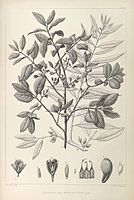en
names in breadcrumbs


Cratoxylum formosum is a species of flowering plant in the Hypericaceae family. Its commercial name in timber production is "mampat".[2]
It is a tropical plant found in the Andaman Islands, Brunei, Burma, Cambodia, China, Indonesia, Laos, Malaysia, the Philippines, Singapore, Thailand, and Vietnam. The trees reach to 35 meters tall, though they rarely achieve the size required for timber exploitation.[2] The trees bloom during the dry period in seasonal tropical climates. They inhabit primary and secondary forests at altitudes from 0-600, with the upper limit to 1200 m., on slopes, river margins and swamps in sandy to clayey soils. [3]
The Catalogue of Life lists two subspecies, C. formosum subsp. formosum and C. formosum subsp. pruniflorum (Kurz) Gogelein. The two are differentiated by the nominate subspecies being totally glabrous, with leaves that are elliptic to oblong, rarely lanceolate and the anther connective not being glandular. [4]
In Laos, Cratoxylum fomosum trees are used:
Local names:
Cratoxylum formosum is a species of flowering plant in the Hypericaceae family. Its commercial name in timber production is "mampat".
It is a tropical plant found in the Andaman Islands, Brunei, Burma, Cambodia, China, Indonesia, Laos, Malaysia, the Philippines, Singapore, Thailand, and Vietnam. The trees reach to 35 meters tall, though they rarely achieve the size required for timber exploitation. The trees bloom during the dry period in seasonal tropical climates. They inhabit primary and secondary forests at altitudes from 0-600, with the upper limit to 1200 m., on slopes, river margins and swamps in sandy to clayey soils.
The Catalogue of Life lists two subspecies, C. formosum subsp. formosum and C. formosum subsp. pruniflorum (Kurz) Gogelein. The two are differentiated by the nominate subspecies being totally glabrous, with leaves that are elliptic to oblong, rarely lanceolate and the anther connective not being glandular.
In Laos, Cratoxylum fomosum trees are used:
for the production of charcoal for their edible young leaves, which can be differentiated as either sour (ສົ້ມ), smooth (ມ່ອນ) or blood-red (ເລືອດ), possibly depending on subspecies (such as in sp. pruniflorum).Local names:
Laotian: ໄມ້ຕີ້ວ [mâi tȋːw] Malay: mampat Thai: ผักติ้ว Phak tiu Filipino: mango-gong, marangguub, salingagon, salingogon Vietnamese: thành ngạnh đẹp (subsp. prunifolium : thành ngạnh vàng)
Cratoxylum formosum in bloom

Fruits

Drawing of the species (1880 to 1883)